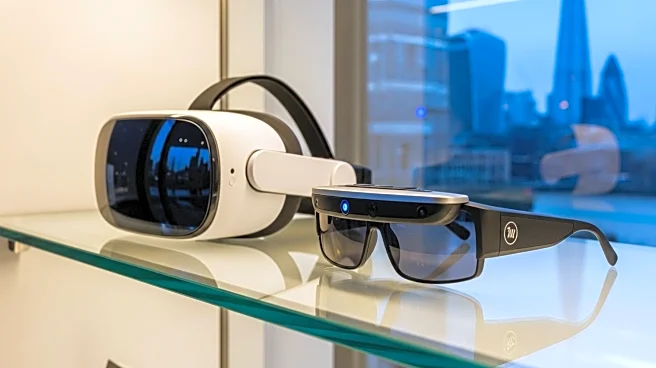What's Happening?
Meta is set to open its first physical store in London, specifically on Oxford Street, aiming to boost sales of its virtual and augmented reality products. This store will be Meta's inaugural bricks-and-mortar presence in the UK, providing customers with hands-on experiences with products like the Meta Quest headset and Ray-Ban smart glasses. The company has already engaged agents to scout potential sites, and its subsidiary, Meta Labs, has registered a UK trademark for the sale and demonstration of VR, mixed reality, and AR hardware and software. Meta, known for its software platforms such as Facebook, Instagram, and WhatsApp, has recently invested heavily in its Reality Labs division, competing with major tech companies like Apple and Microsoft in the hardware sector.
Why It's Important?
The opening of a physical store in London marks a significant shift in Meta's strategy, emphasizing its commitment to expanding its presence in the hardware market. This move could enhance consumer engagement and drive sales of its VR and AR products, which have seen increased interest. By providing a physical space for customers to experience these technologies, Meta aims to solidify its position in the competitive tech landscape. The store's location on Oxford Street, a prime retail area, could attract a high volume of foot traffic, potentially increasing brand visibility and product adoption. This development reflects Meta's broader strategy to integrate AI and AR technologies into everyday life, as highlighted by Mark Zuckerberg's comments on the future importance of AI-enabled glasses.
What's Next?
Meta's planned store in London is part of a broader strategy to expand its retail presence, similar to its rivals like Apple and Microsoft. The company may continue to explore additional locations for physical stores, both in the UK and globally, to further promote its VR and AR products. As Meta continues to develop its augmented reality offerings, it may introduce new products and technologies to enhance user experience. The success of this store could influence Meta's future retail strategies and partnerships, potentially leading to more collaborations with companies like Ray-Ban owner EssilorLuxottica.
Beyond the Headlines
The establishment of a physical store by Meta could have deeper implications for the retail industry, particularly in how technology companies approach consumer engagement. By offering direct interaction with advanced technologies, Meta may set a precedent for other tech firms to follow suit, potentially transforming retail spaces into experiential hubs. This move also highlights the growing importance of AR and VR technologies in everyday consumer products, suggesting a shift towards more immersive and interactive shopping experiences.











